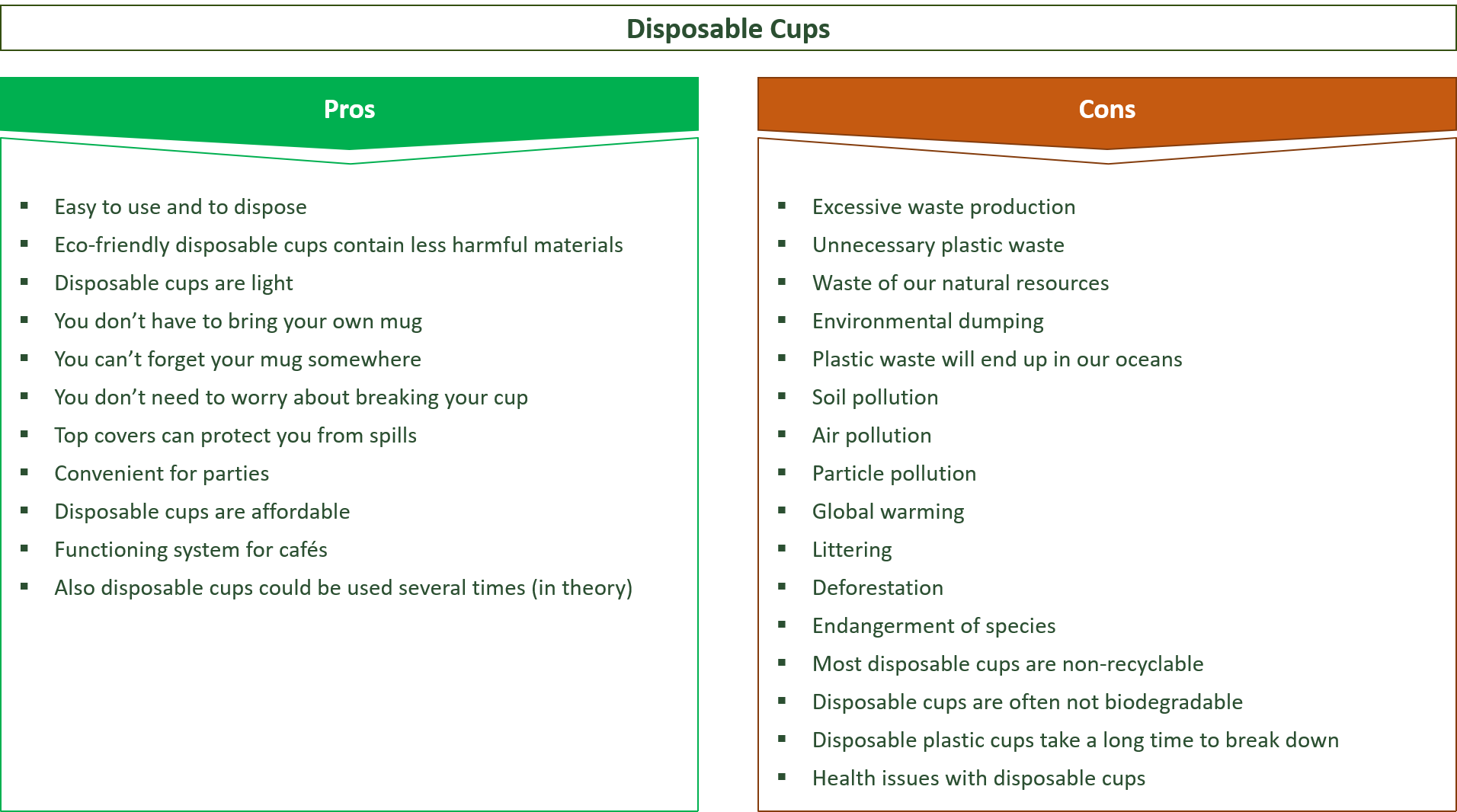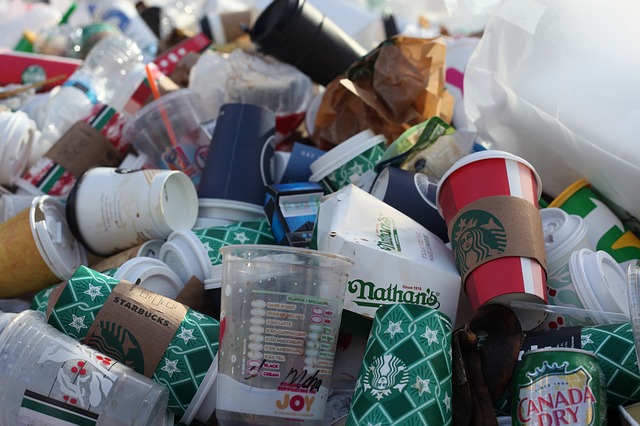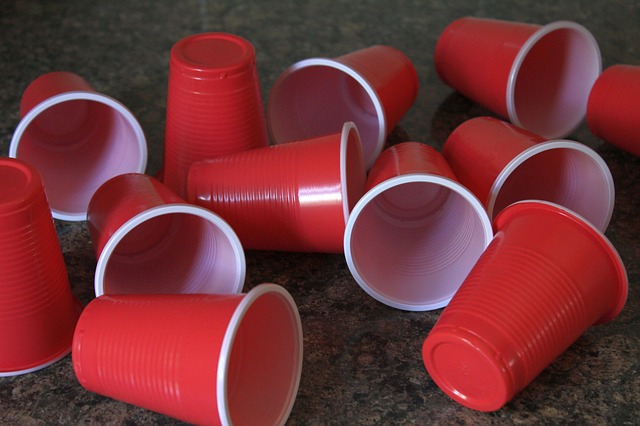“I like my coffee like I like my women. In a plastic cup.”
Taylor Branch, Author
Advantages & Disadvantages of Disposable Cups

The use of disposable cups has become quite popular over the past decade.
People often get a coffee-to-go before they go to work or in lunch break.
We currently use a shocking number of 500 billion plastic cups on a global scale each year.
However, those disposable cups are often made out of plastic or other materials that are quite harmful for our planet.
Thus, even though they are quite convenient, the use of disposable cups also implies serious problems.
In this article, the pros and cons of disposable cups are examined in detail.
Audio Lesson
Contents
Advantages of Disposable Cups
- Easy to use and to dispose
- Eco-friendly disposable cups contain less harmful materials
- Disposable cups are light
- You don’t have to bring your own mug
- You can’t forget your mug somewhere
- You don’t need to worry about breaking your cup
- Top covers can protect you from spills
- Convenient for parties
- Disposable cups are affordable
- Functioning system for cafés
- Also disposable cups could be used several times (in theory)
Easy to use and to dispose
One important advantage of disposable cups is that they are quite easy to use. If you grab a coffee-to-go, you can just pay and take it with you.
You do not even have to drink it at the café, you can just grab it and sit on a bench in a park and enjoy your coffee.
Also the disposal of those cups is quite simple and convenient.
Once you finished your drink, you can just dispose of your cup into the next trash bin and do not have to worry about where to store your reusable mug.
Thus, disposable cups are quite a convenient way to consume your drink and offer you a great level of flexibility.
Eco-friendly disposable cups contain less harmful materials
There are also manufacturers who claim that they invented eco-friendly disposable cups.
While disposable cups will never be entirely eco-friendly, those cups may at least be much eco-friendlier compared to conventional disposable plastic cups.
Thus, if you have to use a disposable cup due to various reasons, at least make sure that you choose the one that is the least damaging for our environment.
Disposable cups are light
Another upside of disposable cups is that they are quite light compared to using a reusable mug that is made out of porcelain or other heavy materials.
Thus, especially for older people who do not have too much power anymore, disposable cups might be a great way to make their lives easier.
You don’t have to bring your own mug
Disposable cups are also quite convenient in the sense that you do not have to carry your own cup with you all the time.
This might be especially true when it comes to business trips.
Quite often, business trips are rather stressful and you might have many things going on in your head and therefore you might not have the nerves to think about bringing your reusable cup at all.
Thus, in order not to stress yourself too much, disposable cups may be more suitable in stressful situations where you have to focus all your mental efforts on other things.
You can’t forget your mug somewhere
Another issue with reusable mugs is that you can easily forget them somewhere.
For instance, if you are traveling, chances are that you might forget it sooner or later when you leave.
In turn, this cup will likely end up in the garbage and the positive effect of using a reusable cup will be quite limited due to that.
In contrast, it doesn’t really matter if you forget your disposable cup somewhere since you would dispose it into the garbage anyways.
You don’t need to worry about breaking your cup
Reusable cups are often quite fragile and you might have to take great care not to break them.
This is especially true when it comes to your travels.
You always have to make sure to pack your backpack in a manner so that your disposable cup is protected properly.
Otherwise, you might experience some unpleasant issues.
Hence, disposable cups are also quite convenient in the sense that they cannot break and you can store them quite easily since they are made out of rather elastic materials like plastic or paper.
Top covers can protect you from spills
When you get a coffee or tea, it will be quite hot at the beginning.
Especially if you are in a rather crowded place, you might be at risk that someone hits you accidentally and you will suffer from spills, which may potentially burn your skin.
Thus, in order to prevent you from this unpleasant surprise, you can use top covers for your disposable cup.
By using one of those covers, you will be protected against spills that can potentially hurt you.
Convenient for parties
Let’s be honest. If you make a party, there are many things that you have to take care of and you might want to make your life as easy as possible.
Therefore, using disposable cups may be a great way to facilitate your life since you can buy them in large quantities and just dispose of them into the garbage once the party is over.
This makes it quite easy to supply a high number of people with drinks without having to buy large quantities of glasses or mugs which you would no longer use after the party is over.
Disposable cups are affordable
Since disposable cups are around for many years, production processes have been optimized over the past years and the costs to produce those cups are usually quite low.
Moreover, also the raw materials are rather cheap, which leads to a state where we can buy large quantities of those disposable cups at a quite low price.
Therefore, it might be quite tempting to rely on disposable cups also from a financial perspective.
Functioning system for cafés
Coffee shops also realized that their customers often do not have plenty of time to sit down and therefore, they made a valid business model out of the coffee-to-go model.
Customers simply often want to rely on disposable cups and cafés have adapted to the customers’ preferences in order to maximize their profits.
Thus, a whole industry branch formed around the disposable cups model, which is widely accepted by the general public.
Also disposable cups could be used several times (in theory)
Many people might not know it, but you don’t have to dispose of your disposable cup after a single use.
In fact, those disposable cups could be used many times before they finally end up in the trash bin.
However, to be fair, even though they could be reused multiple times in theory, the vast majority of people will not do so but rather dispose of those cups after just a single use since they do not want to make the effort to store this used cup somewhere.

Problems of Disposable Cups compared to Reusable Cups
- Excessive waste production
- Unnecessary plastic waste
- Waste of our natural resources
- Environmental dumping
- Plastic waste will end up in our oceans
- Soil pollution
- Air pollution
- Particle pollution
- Global warming
- Littering
- Deforestation
- Endangerment of species
- Most disposable cups are non-recyclable
- Disposable cups are often not biodegradable
- Disposable plastic cups take a long time to break down
- Health issues with disposable cups
Excessive waste production
From the previous analysis, it is clear that the use of disposable cups has its advantages.
However, there are also some problems related to disposable cups.
One downside of disposable cups is that the excessive use of those cups leads to excessive waste production.
Every year, around 500 billion disposable plastic cups are used. You heard right!
This number is just insane and everyone of us should as themselves whether this is a number humanity should be proud of or not.
It should be clear to you that this level of excessive waste production also implies vast environmental problems and is not sustainable in the long run.
Thus, the excessive waste production, especially from disposable plastic cups, is a big problem and we should greatly reduce the number of disposable cups we are using to reduce our overall waste production.
Unnecessary plastic waste
Plastic waste is especially harmful to our planet since it is often not reusable and recyclable.
Thus, by using disposable plastic cups, large amounts of this harmful waste are produced, which will lead to all sorts of environmental problems.
Therefore, in order to reduce those adverse environmental effects related to plastic waste, we should avoid the use of disposable plastic cups whenever we can.
Waste of our natural resources
We should also realize that disposable cups are also quite bad in terms of the use of our natural resources.
While reusable cups and mugs can be used for many years after they had been produced, disposable cups will end up in the garbage after just a single use and precious natural resources are wasted.
Since many billions of those cups are used each year, the amount of natural resources that is wasted due to the use of disposable cups is shocking.
Environmental dumping
You might not know it, but large amounts of the waste we in our Western world produce is not actually processed in our countries, but rather shipped to poor developing countries since they often have laxer regulations regarding waste management and waste disposal and it is easier to get rid of our waste in those countries.
However, as you can imagine, those waste receiving countries are literally drowning in waste due to environmental dumping and therefore, everyone of us should reduce his or her waste production that is associated with the use of disposable cups in order to relieve those poor developing countries from the burden of our waste.
Plastic waste will end up in our oceans
There are several ways how to get rid of our waste.
Most of it is either burned, disposed into landfills or shipped to other countries.
However, a fraction of the overall waste that is produced on a global scale will eventually end up in our oceans, where it can have significant negative effects on marine life.
Moreover, since we consume fishes and other aquatic animals, this plastic will also end up in our bodies sooner or later in the form of microplastic.
Thus, if we want to protect our environment and also our health, it is crucial to avoid plastic waste from disposable cups as often as possible.
Soil pollution
Since part of our waste ends up in landfills, it also significantly pollutes the soil.
This is especially true for landfills that are not set up properly due to lax waste management regulations.
This kind of soil pollution will in turn contribute to groundwater pollution since harmful ingredients of the waste are washed through the soil into our groundwater sooner or later.
In turn, there might be shortages in clean drinking water in several regions of our planet due to that.
Thus, in order to limit our waste production, refraining from the use of plastic cups might be a good idea to protect the lives of many people on our planet.
Air pollution
The use of disposable cups also implies serious levels of air pollution.
Since part of the waste that is due to the use of those cups is burned, harmful gases are emitted into our atmosphere due to those burning processes.
In turn, the air quality may significantly suffer in those regions where large amounts of waste are burned, which is not only quite unpleasant but can also lead to serious health issues.
Particle pollution
The combustion process of waste also implies significant levels of particle pollution.
Those fine particles are often not visible, yet they also significantly lower our air quality and can lead to serious health issues, including asthma and other pulmonary diseases.
Global warming
Since through the burning of waste related to the use of disposable cups, large amounts of harmful greenhouse gases are emitted into our atmosphere, the use of those cups also implies to speed up global warming.
Since global warming is one of the biggest environmental problems humanity faces at our current point in time, we should be reasonable enough to refrain from the use of disposable cups and to make the effort to use reusable cups or mugs instead.
Littering
Another downside of the use of disposable cups is that people often incorrectly dispose of their plastic cups.
Instead of disposing them into the garbage, they often dispose of their cups right where they stand onto the ground and seem not to care about our environment at all.
Thus, significant littering is another problem related to disposable plastic cups.
Deforestation
The use of disposable plastic cups also implies that we have to cut down forests in order to produce paper cups.
In turn, this can lead to vast destruction of natural habitats.
We should really ask ourselves whether we want to destroy our environment just for the benefit of a little bit more convenience in our daily life.
Thus, if you want to protect our forests, go for reusable cups instead of disposable paper cups.
Endangerment of species
Deforestation related to the use of disposable cups also contributes to the endangered species problem.
Over the past decade, many species have become endangered or even extinct due to excessive human interventions in nature.
If we do not want to lose even more species, we should refuse from using disposable cups as often as we can.
Most disposable cups are non-recyclable
Another issue with disposable cups is that they are usually non-recyclable.
Even though some manufacturers claim that their cups are eco-friendly, most of them can still not be recycled since they are plastic-coated.
Disposable cups are often not biodegradable
Due to the plastic coating, even disposable paper cups are not biodegradable most of the time.
Therefore, large amounts of waste are produced through the use of disposable cups and the related adverse effects for our environment are enormous.
Thus, don’t just rely on the promise of manufacturers that those cups might be eco-friendly.
It would still much eco-friendlier to use reusable cups instead.
Disposable plastic cups take a long time to break down
Another issue of disposable plastic cups is that they take a quite long time to break down.
It can take up to 100 years until those cups are decomposed.
Thus, if the plastic waste related to the use of those disposable cups ends up in our oceans, it will take many decades to get rid of this waste.
Even then, plenty of microplastics may be left, which may take even much longer to decompose.
Health issues with disposable cups
Even though most disposable cups are heat-resistant, opponents of disposable cups often claim that those cups can pose health risks.
For instance, harmful chemicals from plastic cups may enter our beverages.
Thus, disposable cups may even imply a certain health risk if the beverages inside are too hot.

Top 10 Disposable Cups Pros & Cons – Summary List
| Disposable Cups Pros | Disposable Cups Cons |
|---|---|
| Easy to use | Plenty of unnecessary waste |
| Easy to dispose of | Depletion of natural resources |
| Convenient way to get a drink | Air pollution |
| High level of flexibility | Particle pollution |
| Disposable cups cannot break | Soil pollution |
| They are lightweight | Water pollution |
| Disposable cups are affordable | Disposable cups are not biodegradable |
| Could also be used several times (at least in theory) | Deforestation |
| They are convenient for parties | Littering |
| You don’t have to bring your own cup | Potential health issues |
Should You Use Disposable Cups?
As we have seen from the previous argumentation, there are many pros and cons related to disposable cups.
However, in my opinion, the cons outweigh the pros and we should refrain from the use of plastic cups in order to protect our environment.
Protecting our planet should have priority over the gain of a little bit more convenience in our daily lives.
Sources
https://en.wikipedia.org/wiki/Disposable_cup
https://www.nationalgeographic.com/environment/plasticpledge/
https://www.nytimes.com/2020/02/10/business/dart-foam-recycling.html?ref=oembed
https://www.earthday.org/fact-sheet-how-much-disposable-plastic-we-use/

About the author
My name is Andreas and my mission is to educate people of all ages about our environmental problems and how everyone can make a contribution to mitigate these issues.
As I went to university and got my Master’s degree in Economics, I did plenty of research in the field of Development Economics.
After finishing university, I traveled around the world. From this time on, I wanted to make a contribution to ensure a livable future for the next generations in every part of our beautiful planet.
Wanna make a contribution to save our environment? Share it!
